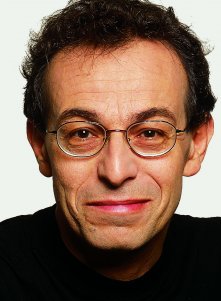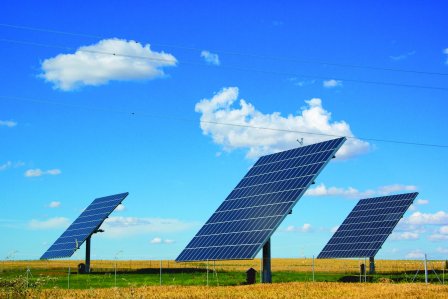The technologists and engineers of today are being asked to do something that is “close to mission impossible,” says Prof. David Cahen of the Weizmann Institute of Science’s Department of Materials and Interfaces. “We’re asking them to come up with better solutions to our energy problems based on fundamental science that essentially stopped in the mid-1980s.”

Prof. Cahen explains that after the global crash in oil prices during the early- to mid-1980s, support for research in alternative energy decreased drastically as well, resulting in what is now an extremely poor base on which to build new technologies. Meanwhile, the demand for energy is increasing worldwide, oil prices are unpredictable, and the burning of fossil fuels is causing pollution and releasing greenhouse gases that contribute to global warming. “We cannot afford another period of not-so-benign neglect,” he states.
To help provide this essential scientific groundwork and develop clean, efficient, affordable, and sustainable energy sources, the Weizmann Institute launched the Alternative Energy Research Initiative (AERI) in 2006. Prof. Cahen, the first scientific director of the AERI, has focused much of his own research on alternative energy. He is particularly interested in solar cells—devices that use the sun’s energy to generate electrical power—and his work includes studying how to improve their performance and cost-effectiveness; for example, he and his colleagues recently showed how very inexpensive mirrors can help increase the utilization of sunlight by such cells.
Under Prof. Cahen’s guidance, the AERI provides support for innovative sustainable-energy research projects conducted by Weizmann scientists, with particular emphasis on work that is multidisciplinary, at an early stage, or that would otherwise be unlikely to compete successfully for funding.
One such project is being carried out by scientists in two departments: Prof. Uri Pick of the Department of Biological Chemistry and Prof. Avihai Danon of the Department of Plant Sciences. Profs. Pick and Danon are investigating microalgae as a new source of biomass to generate biofuel. Some types of algae produce oil that can easily be converted to biodiesel. Algae have a number of advantages over other biofuel crops such as corn and sugarcane: it can be harvested year-round; it can be grown rapidly in saltwater or wastewater, without draining water resources; and it produces no waste byproducts.
Profs. Pick and Danon are studying the ways several strains of algae use sunlight and carbon dioxide (CO2) to store energy and to grow, and are working to identify the genes that regulate the algal metabolism. Eventually they hope to create genetically engineered algae that can be grown in a controlled and sustainable way, and that can yield a liquid fuel source in much greater amounts than the best plant crops can produce.
Another AERI project is being conducted by Profs. Edward Bayer, Gideon Schreiber, and Dan Tawfik of the Institute’s Department of Biological Chemistry, who are researching ways to break down cellulose—the main component of plant cell walls—so it can be used as a raw material for fuel. “When we have cellulose as fuel, we can also transport it and can even use it in fuel cells,” says Prof. Cahen.
Prof. Bayer has been conducting basic research on cellulose breakdown for more than 20 years and is one of the world’s foremost experts on the topic. He focuses on the cellulosome, a group of enzymes that degrades cellulose, and uses genetic engineering to develop artificial cellulosomes that are more effective at breaking down, for example, manmade cellulose products such as paper. Now he is collaborating with Prof. Schreiber, an expert in designing and altering protein-protein interactions, and Prof. Tawfik, an expert in enzyme evolution, to design artificial cellulosomes with improved activity.

The most recent version of their artificial cellulosome can turn a lab dish full of finely shredded paper into simple sugar syrup in about a day. These simple sugars are ideal for further conversion to liquid fuel, such as ethanol. In the future, the artificial cellulosome might be adapted to other cellulose-rich energy resources such as agricultural waste, and the scientists hope that liquid fuel will someday be made from recycled trash.
Another important goal of the AERI is to encourage young scientists to direct their careers to the pursuit of energy-related problems. Currently, says Prof. Cahen, few students are attracted to the field because of a dearth of funding and because relatively few top scientists pursue novel research in sustainable energy. To break this pattern, Prof. Cahen and his colleagues are making new outreach efforts, such as inviting top Israeli students to seminars. “We are planting the seeds and we hope that, in a few years, we can hire some of them as faculty,” he says.
The World Energy Council projects that worldwide energy demand will be at least double its present level by the middle of this century. The basic research conducted as part of the AERI is needed today, Prof. Cahen says, since “there’s typically a 15- to 20-year lag between a finding in the laboratory and its industrial success. Therefore, whatever we do now will be practical around 2025 or 2030, at the earliest.”
He stresses the importance of exploring many different approaches to sustainable energy. No single technology is likely to be able to supply all of the world’s future energy needs, and any solution will probably involve a mix of solar, biomass, wind, hydroelectric, nuclear, and other technologies. We need to work, Prof. Cahen says, “toward a strong, sustainable mosaic of many solutions, which, as a whole, will provide the solution.”
Prof. David Cahen's research is supported by the Nancy and Stephen Grand Research Center for Sensors and Security; Mr. Yehuda Bronicki, Israel; Mr. and Mrs. Yossie Hollander, Israel; and Dr. and Mrs. Robert Zaitlin, Los Angeles, CA. Prof. Cahen is the incumbent of the Rowland and Sylvia Schaefer Professorial Chair in Energy Research.
